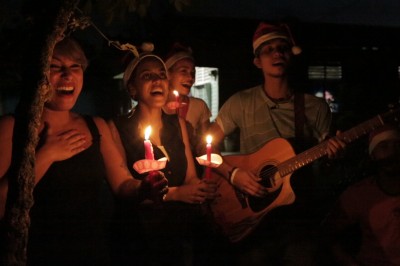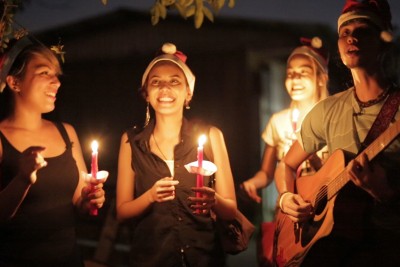BY ELROI YEE
alltherage@thestar.com.my
Razak Mansion Flats is a strange place. The lawns are wide and well kept, with old overhanging trees keeping the temperature cool. There are playgrounds and a basketball court. There is a community hall. The flats themselves – a collection of square blocks patterned with rectangular ventilation openings – are remarkably pretty in a nostalgic-minimalist way.
Yet, the flats were actually built for the poor. Officiated by then prime minister Tun Abdul Razak Hussein, it was one of three low-cost housing projects in Kuala Lumpur developed by the government in the late 50s to early 60s. It was a time when Malaysia was fast urbanising, and these low-cost housing projects became home to former squatters and rural job-seekers who were attracted by the city’s promise of a better life.

Siti Robiah and four of her grandchildren at their home in Razak Mansion flats. The small one-bedroom flat houses Siti Robiah and her husband, their seven grandchildren, and their blind and mentally challenged son.
While most of the residents have since moved on to better things – hard work paving the way for better opportunities for their children, who in turn support them in their golden years – for some families, things just didn’t work out.
Take for example Siti Robiah’s family. She and her husband moved to Razak Mansion from their squatter house more than 30 years ago. She was around 20 years old, she had a modest but stable job, and she had just married her husband. It must have been a promising time for her, as it was for the city of Kuala Lumpur, with concrete signs of progress and development beginning to rise from the ashes of war and conflict.

Siti Robiah and her husband have to care for their seven grandchildren and their youngest son. They survive on the husband’s minimum-wage salary of RM900.
That was then. Today, Siti Robiah and her husband are pushing 60. They have four children, none of whom are able to support them. In fact, they need to support their youngest son, who is mentally challenged and blind. They also have to care for seven of their grandchildren, because their own parents cannot cope. To make ends meet, Siti Robiah’s husband works the night shift as a security guard, even though the dust from the construction site he works at exacerbates his chronic asthma. “Sebenarnya dia tak boleh kerja,” says Puan Siti, when we visit her at her one-room unit. “Tapi dia terpaksa kuatkan diri untuk kerja. Apa boleh buat?” He earns RM900 a month, the minimum wage in Peninsular Malaysia. He supplements his income by selling discarded tin cans, which he sometimes collects with his youngest grandson.

Siti Robiah and four of her grandchildren at the door of their home, where the Voice of Hope choir sang them a few songs.
They do not enjoy the luxury of a developing country, but they certainly suffer its pains. Aside from the husband’s asthma, both of them are severely diabetic, and she also suffers from high blood pressure and heart problems – all are likely the results of the modern Malaysian diet. She shows us her stash of medication. “Duit tak ada, tapi ubat banyak sampai satu tupperware,” she tells with a wry laugh. She opens a small pouch, revealing her insulin injections, and tells us that she reuses the needles to save cost.
Her many health problems mean that she has many hospital appointments to keep, but because there is no one to care for her youngest son and grandchildren, she struggles even to make it to these appointments. She cannot take the bus or train, as the son tends to make a scene, so she has to take a taxi, which is too expensive for her. She has already missed a few appointments, even though she is scheduled for a heart operation to replace a faulty heart valve in late February. “Kalau boleh, saya tak nak surgeri,” she says. It simply costs too much, and she worries about those under her care. “Kalau saya duduk hospital, siapa jaga anak cucu semua?”

Siti Robiah with two of her youngest grandchildren, after receiving gifts of food and medical supplies from the R.AGE team.
To make her Christmas a little brighter, we returned for a second visit, bringing her some food supplies, as well as adult diapers for her son. We also bought her a blood sugar level test kit, which doctors have been advising her to buy, as it helps her adjust her thrice-daily insulin dosage according to her blood sugar levels. We were accompanied by the Voice of Hope choir, who sang the family a few songs.
During the visit, Puan Siti spoke of a neighbour’s wedding kenduri taking place the next day. She had volunteered to help the neighbour chop onions, even though she can barely walk without support. Hearing her talk of this was heartening and saddening at the same time. Puan Siti and her husband are clearly kind, hardworking people. Yet despite their best efforts, they are still in poverty, seemingly just because life dealt them a bad hand.

Joanne Poh, the coordinator for the Voice of Hope choir, pictured with Siti Robiah’s two youngest grandchildren.
At the end of our visit, we filed out of her home, down the dimly-lit stairwell, and out onto the well-kept lawns of Razak Mansion, now bathed in the orange cast of streetlights. Just beyond a fence, an expressway was buzzing with traffic. Beyond that, the lights of the city glowed high into the night sky.








Tell us what you think!